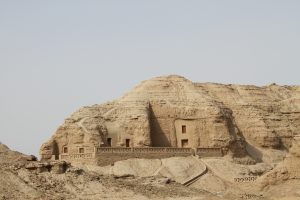Abstract
This Doctoral School will address key questions concerning medieval Chinese writing practices and manuscript culture, in addition to providing an introduction to important historical lexicographical material. As such, the course will address essential issues concerning the research of and work with medieval Chinese source materials.
Description
The course is aimed at PhD students specializing in medieval China and medieval Chinese texts and manuscripts (focusing on the period between 5th and 10th century), as well as various aspects of Chinese writing. The course will enhance the PhD students’ understanding of the highly complex mechanisms concerning the production of Chinese handwritten manuscripts and the multifaceted use of Chinese characters. In addition to a general introduction to issues of Chinese writing (with a focus on Medieval Chinese), the discussion and reading of important source materials (e.g., Dunhuang manuscripts) will be one of the focal points of the lectures. Several aspects of medieval Chinese handwriting will receive special attention, such as phenomena of “standardization” and “variation”, the phonetic use of Chinese characters in manuscripts (phonetic loans / phonophoric elements), as well as historical material on the acquisition of writing / writing exercises among the Dunhuang findings. This will enable the students to gain a clearer understanding of medieval writing practices, help them in their critical approach to source materials, and concretely enhance their ability to decipher historical textual material. In the second part of the course, questions of lexicographical encoding, Chinese characters classification, and the organization of lexicographical material will be discussed. This part aims at helping the students to become familiar with the structure of these works, and enabling them to make use of this important type of source material. The course will also provide the opportunity for discussions with the PhD students and individual tutoring.
Instructors/lecturers
Prof. Imre GALAMBOS – Cambridge University – Faculty of Asian and Middle Eastern Studies – University of Cambridge – Sidgwick Avenue, Cambridge CB3 9DA, UK
Imre Galambos is one of the world’s leading experts on the development of Chinese writing. Besides being an expert in Ancient Chinese writing, he has worked extensively on many aspects of the palaeography of medieval Dunhuang manuscripts, as well as manuscript culture. From 2002-2016 he was the Project Manager of the large International Dunhuang Project at the British Library, London, one of the world’s largest depositories comprising of 10.000s of Dunhuang manuscripts. Since recently, he has also been the President of the European Association for the Study of Chinese Manuscripts.
Supporting lecturers
Dr. Christoph Anderl and Dr. Ann Heirman
Time Schedule and Venue
October 8 to October 12, 2018
Venue: het Pand, Onderbergen 1, 9000 Gent, room Jan Gillis
- Monday, October 8th
09:30: Welcome of the participants by the Doctoral School organizers (Christoph Anderl, Ann Heirman)
* 10:00 – 12:00: General introduction to Chinese writing (Imre Galambos)
12:00 – 13:30: lunch break
13:30 – 15:00: Introduction: Aspects of writing practices in Dunhuang manuscripts (Imre Galambos)
15:15 – 16:45: Dunhuang manuscripts containing writing exercises / “schooling” manuscripts (Imre Galambos)
- Tuesday, October 9th
10:00 – 12:00: Outside influences in Chinese writing (Imre Galambos)
12:00 – 13:30: lunch break
13:30 – 15:30: Segmentation and presentation of Chinese texts / text readings (Imre Galambos)
- Wednesday, October 10th
10:00 – 13:00: Aspects of “standard and variation” (Imre Galambos)
13:00 – 14:00: lunch break
14:00 – 17:00 Discussion / meetings with students, Q+A / presentation of a selection of PhD projects on writing (Imre Galambos, Christoph Anderl)
- Thursday, October 11th
* 10:00 – 12:00: Chinese medieval lexicography: An introduction / presentation of the Ghent Database of Medieval Chinese Texts (Christoph Anderl)
12:00 – 13:30: lunch break
13:30 – 15:30: The structure of the 10th century dictionary Longkan shoujing (Christoph Anderl)
- Friday, October 12th
* 10:00 – 12:00: Reading of selected passages of the LKSJ (Christoph Anderl)
12:00 – 13:30: lunch break
13:30 – 15:00: Phonophoric elements in the classification system of LKSJ (Christoph Anderl)
15:15 – 17:00: Final discussions with students / short presentations of student projects (Christoph Anderl, Ann Heirman)
* Lectures also suitable for a more general audience (including PhD students of general linguistics, etc.)
